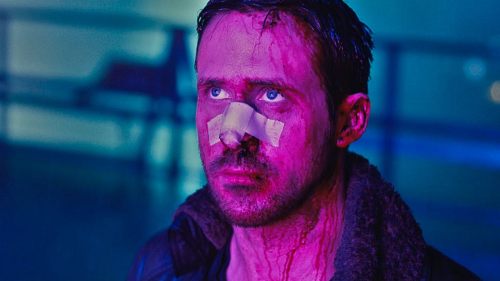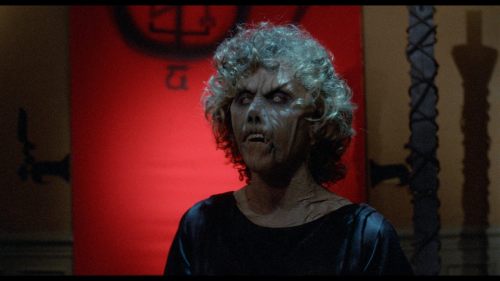Terror Tuesday: The Horrors Of Movie Novelizations
I can only assume that they just don’t sell like they used to, because I know fans have always enjoyed picking these things up. Older ones sell for several times their cover price on eBay and the like, with the Friday the 13th entries being particularly sought after. And horror novels in
particular are enticing, because they tend to be the films that go through the most changes from screenplay to finished product. Wolfman is a terrific example; we all know the hell that movie went through, and even the expanded director’s cut suffers from a rushed first act and muddled character motivations. The novelized version, however, improves several of these issues. We get a lot more of Talbot in London, even part of his performance of Hamlet is depicted, instead of the quick shot we got in the theatrical version. The relationship between him and Gwen (the Emily Blunt character) is also expanded, and Hugo Weaving’s Abberline is given more to do as well. Sure, you don’t see the FX, or Ms. Blunt in those tight corsets, but at least you can understand why folks are doing what they do, unlike in any version of the film I’ve seen. Universal also heavily tinkered with James Wan’s Saw followup Dead Silence – it’s a damn shame no one ever thought to adapt the original script of that so we could get a stronger idea of what he and writer Leigh Whannell originally had in mind before the script was rewritten by Ehren Kruger.
Novelizations also provide a glimpse into alternate versions of the story that were abandoned. Often, the author is given an earlier script to work from in order to get the book out on time for the movie’s release, and so their resulting novel might not exactly match the film. One great example is Alan Dean Foster’s novelization of John Carpenter’s The Thing (a novelization of a movie based on a short story!), which was based on an earlier draft of Bill Lancaster’s script. Instead of MacCready blowing up the structure with explosives, he drives a big ass tractor (or some sort of bulldozer type thing – it’s been a while since I read it) around the complex, demolishing the buildings that way. It also explains what happened to Nauls, and includes some other things the movie glosses over or skips entirely. Now, I prefer the way the movie ended, but as a giant fan of the film, I found it fascinating to get a detailed account of how the film’s final 10 minutes originally would have occurred, instead of just a vague “oh originally he drove a tractor around” explanation. Similarly (and yes, obviously not horror), the Die Hard with a Vengeance novel had the original ending where McClane went to Russia and had a man to man faceoff with Simon, using riddles and a modified grenade launcher to settle their score. This appeared on the DVD, yes, but not until what, the year 2000? I knew about that thing for 5 years prior (the book also has more about why he split from Holly, in case you were wondering).
Sometimes they can add another layer to the movie. Friday the 13th Part VI: Jason Lives features a brief appearance by a
heavy-drinking graveyard attendant, someone you probably won’t think much of when you watch the movie other than “why didn’t he get killed?”. But fans of the novel will know that he actually had a relationship with Jason’s father (!), Elias, who was paying him to make sure the grave was kept up and left alone by folks like Tommy (so he sucked at his job, I guess). So now when I watch the movie, that’s always at the back of my mind.
There’s also another kind of tie-in that I don’t see too often anymore: the spinoff novel. Back in the mid 90s, I had a few books by author Eric Morse that were related to the Friday the 13th series, but didn’t feature the actual Jason. Instead, outcasts or folks who were wronged in some way would find Jason’s mask in the woods, and when they put it on they would gain his strength and ability to make creative use of the various farming tools that are apparently strewn about the Crystal Lake area. They weren’t particularly great, but they were fun; the Fangoria fan equivalent of a beach novel (in fact I recall reading part of one on a beach in Maine), and were also nice to have in that terrible long period in between Jason Goes To Hell and Jason X – better than nothing, right? There are also a number of sequel books to Jason X, which DO feature the actual Jason (or Uber Jason, I guess) and has him fighting cults and other nonsense (they also adapted the Jason X film, albeit three years after its theatrical release). Michael Myers and Freddy Krueger also got a few spinoff novels; oddly despite my love of Halloween I never got any of the Myers ones, but I got an “anthology” of a few of the Freddy novels sitting on my bookcase, waiting for… well, a long trip to the beach.
My favorite of these have to be the Blair Witch Files, which came out in between the two films. I have five of them (I think
there were eight in total), and they were kind of cool if you bought into the mythology of Elly Kedward and Rustin Parr and all that. They were the investigative journals of a guy named Cade Merrill, who was trying to get the true story behind some of the incidents mentioned in the film (or other canon parts of the story, i.e. the website stuff). What I enjoyed about these is that they helped further develop the Blair Witch mythology, unlike say Morse’s Jason books which in no way explored the actual world of the films beyond base references. What can I say, I was/am a Blair Witch junkie (I also have “The Secret Confession of Rustin Parr” and at least two “Dossier” type books about the case. And all three PC games. And the trading cards. And…).
But they just don’t do a lot of cool shit like this anymore. Hell, Avatar doesn’t even have an official novelization yet, just some goofy “Guide to Pandora Flora” or something along those lines. You think of all those franchises that Dimension controls: Hellraiser, Children of the Corn, Halloween, Scream, Mimic... why didn’t they ever try to make a few bucks by hiring hungry authors to come up with stories set in their universes? It’s not like they have a lot of quality control when it comes to protecting their cash cows – they made Hellraiser: Revelations for about 12 cents just so they could retain the rights to the series. And unlike the movies, a novel wouldn’t have to worry about only having Doug Bradley for 2 days (or not at all, in Revelations’ case), or limited FX budgets, or any of that stuff – they could do whatever they want. And really, how hard would it be to make a better story than the ones we got in the last 4-5 sequels? There was a movie where Pinhead was part of an online role playing game, for Christ’s sake.
Saw is another one that could lend itself to this sort of thing. I’m a big fan but I don’t memorize the movies inside and out; I’m sure there are some dropped story points that someone could expand upon and come up with a fun story, not unlike what Konami is doing with their video games that are set in between the first few films and, supposedly, authorized as canon by Lionsgate/Twisted. The movies are done, but that doesn’t mean the story has to be – surely they can get a few novels just out of the idea that John Kramer had disciples that would come help him (or avenge his wife) at a moment’s notice, which is something we saw in Saw 3D. Who are these guys? What sort of tests did they endure? I don’t know, but if I saw a book in the horror section for 7.99, I’m sure I’d pick it up to find out. I fly 3-4 times a year; can’t count on the in-flight movie and Sky Mall alone to entertain me. But the only sort of side-stories I see are based on TV properties like Buffy or Supernatural, or video game series like Dead Space; the films are all but completely left alone.
There is, however, a sort of compromise: we are seeing more graphic novels based on movies. Often prequel stories that lead into the events of the film (or provide a bridge from part 1 to part 2 in the case of sequels), these are fine, but many are just plain pointless. Dark Horse just recently concluded a very drawn out 4 issue series that serves as a prequel to Let Me In, but the story is very similar, and since it took so long to complete (the first issue was released before the movie was in theaters; the final issue 2 months after it hit DVD), I don’t see the draw. There’s also an ongoing series set in the 28 Days/Weeks Later world, and, yes, a new Hellraiser series that continues the relationship between Pinhead and Kirsty Cotton (who did not exist in the original novella by Clive Barker, who is co-writing the comic with Chris Monfette).
But really, I just want those novelizations back the way they used to be. Apart from the big series like Underworld and Resident Evil (which did NOT continue the novelization tradition with Afterlife, natch), it seems that novelizations don’t exist, or if they do they’re not often stocked on the shelves of Barnes & Noble. A few random ones sneak through (See No Evil, the underrated slasher starring WWE’s Kane, has one, by the film’s own screenwriter, Dan Madigan), but for the most part, our modern horror films have gone un-expanded by newcomer authors (or established ones – Maberry also wrote the awesome “Patient Zero”, which is sort of like Jason Bourne meets Dawn of the Dead). Even the PG-13 films, which you’d think would be an easier sell, are under-represented; there are no novelizations of The Grudge or The Ring as far as I know (and believe me, I looked – I’d love to know what was going through Naomi Watts’ character’s mind as
she was besieged by CGI elk in the 2nd film).
Because ultimately, I think we are missing out on some hilarious finds in 10 years or so. Part of what delights me about looking for these things is seeing which movies someone found worthy of adapting into novel form. I myself own the following: Shocker, Crow: City Of Angels, Demon Knight, and New Nightmare, and I still kick myself for not picking up Child’s Play 3 when I had the chance. And that’s just horror – look carefully on my bookshelf and you will see a bona fide 200 page novel based on the script for Broken Arrow, a film that is 75% slow-motion shots of guys diving around while being shot at. I just hate to think that in 2020 or so, kids that are now in grade school or high school will be browsing their bookstores and finding absolutely nothing worth chuckling over. “Why did they make a novel out of Sorority Row?” – that is something no one will ever actually say. A pity.
In addition to reading the novelization of Armageddon, Brian watches a Horror Movie A Day.



